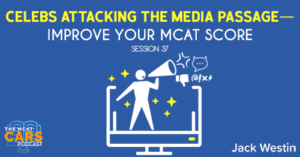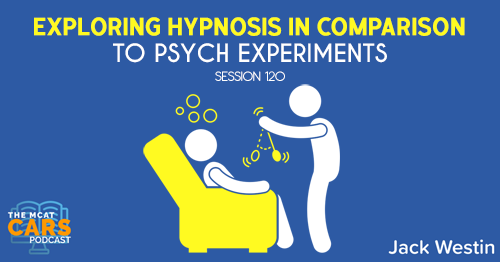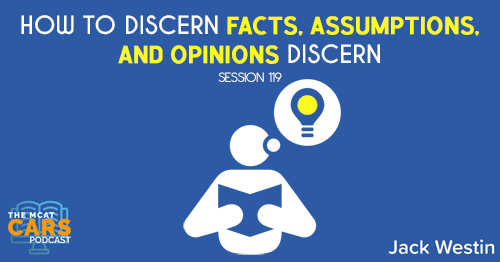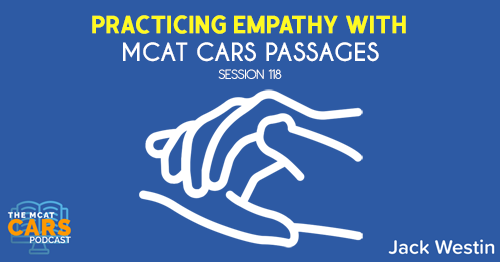Apple Podcasts | Google Podcasts

Session 37
Our episode today is all about celebrities. Once again, we’re joined by Jack Westin. If you’re looking for more help with your CARS section, check out Jack Westin’s free daily passages that you get in your email inbox.
If you haven’t yet, check out The Premed Years Podcast. Back in Episode 337, I interviewed Dr. David Puder, a psychiatrist who works with a lot of medical students dealing with text anxiety. So be sure to take a listen to that as well.
Listen to this podcast episode with the player above, or keep reading for the highlights and takeaway points.
[02:10] How to Deal with Getting a Bad Score on the CARS Course
Jack recommends that if you took the CARS course and you didn’t get the score you wanted, look at how you studied and reviewed. The course is very comprehensive including how to pick up ideas and read sentence by sentence. Jack runs through a series of questions that gauge the understanding of their skills.
Hence, you really need to practice enough. Be realistic and put in the right amount of time given your goals and how much time you have to study.
If you get a bad score, you’re going to go through the five stages of grief. That’s normal. Jack advises that you take a break.
Some students get a low score and get a great score after taking the course. While there are also some students who could get the same score as when they started. And this can all come down to your nerves. You need the ability to critically think.
'What does it take to succeed? It's not your intelligence. It's not your IQ... but it always comes down to how bad you want it.'Click To TweetAt the end of the day, how bad do you really want this? How willing are you to admit that you have weaknesses that you can improve on? Once you come to realize that, it’s going to be an easy process.
People who are hesitant with signing up for a course generally have this mindset that they’re weak and they’ll never be able to improve. Jack highly challenges this type of thinking.
Focus on your weaknesses. See what you did wrong. Reviewing is super important. If you don’t know what to look for, then it’s going to be hard to review.
'Anyone can improve. Just give yourself a chance to improve.'Click To TweetLink to article:
“For every action, there is an equal and opposite reaction—and whatever their advantages, the rich and famous are just as subject to the laws of physics as the rest of us. On the spectrum of strangely celebrity-specific forms of self-expression that have proliferated in the mid-to-late 2010s, the Notes app apology occupies one end of the spectrum: a public performance of contrition, dramatically self-flagellating before an audience of millions. This week, we’ve seen an unusually dense concentration of the social media apology’s perfect inverse: the defiant act of self-defense, used to rally the force of public opinion against a perceived attack.
On Wednesday evening, the actress Olivia Munn posted, to multiple social media platforms, a statement she titled “a short essay on the ugly behaviors of the @fuggirls.” Munn is referring to the popular celebrity fashion site Go Fug Yourself, and includes for reference screenshots of a week-old post headlined “If Only I Had a Dollar for Every Time I’ve Said, ‘Oh My God Olivia Munn,’” as well as a biography containing full names and photographs of Go Fug Yourselfcofounders Heather Cocks and Jessica Morgan. Munn accuses Cocks and Morgan, in their coverage of both her own fashion choices and those of other female celebrities, of “propagat[ing] the idea that our worth is predominantly (or singularly) tied to our looks.” As a successful actress, Munn acknowledges, “there are some things you sign up for,” but she argues Cocks and Morgan’s commentary isn’t included in that bargain, citing a Maryland high school’s recent instance of sexual harassment within its senior class as inspiration for speaking out.
Munn’s statement is unusual in its length and specificity, but her qualms with media coverage appear to be shared by other public figures. On Sunday, the pop musician Lizzo subtweeted an ambivalent Pitchfork review of her major-label debut album, writing with signature brio: “PEOPLE WHO ‘REVIEW’ ALBUMS AND DON’T MAKE MUSIC THEMSELVES SHOULD BE UNEMPLOYED.” The remark earned some measured backlash, though it also read like an understandable response to an unprecedented level of exposure for a previously lesser-known artist not accustomed to such scrutiny. That’s not quite as true for a superstar like Ariana Grande, who responded on Wednesday to an E! News segment criticizing Justin Bieber’s cameo at her Coachella set with a since-deleted tweet reading, in part: “one day everybody that works at all them blogs will realize how unfulfilled they are and purposeless what they’re doing is … i can’t wait for them to feel lit inside.”
Remarkable as it may be for so many instances of celebrity retaliation to flare up in a single week, the idea that critics are fair game for rebuke by those they cover is not a new one. The stand-up comedian Michael Che, who serves as co-head writer for Saturday Night Live and coanchors the show’s famous Weekend Update segment with Colin Jost, frequently takes to his Instagram Stories to express what, per his handle, @chethinks. Often, that means airing his grievances against journalists who cover the show, including Daily Beast columnist Samantha Allen and freelance writer Seth Simons. One of Che’s latest targets was Uproxx writer Steven Hyden, who published a piece last Friday titled “Why Does Everyone (Still) Hate SNL’s Colin Jost?” Che responded with a hyperbolic, transparently false accusation that Hyden performs fellatio on stray dogs. Hyden, for his part, responded with relative equanimity, and the resulting furor died down after a few days. The incident mostly serves as an unusually outlandish example of a recurring pattern, both for Che himself and other performers with considerable platforms they can wield to their own advantage.
Such lashings out come from an understandable place. As public figures, pop stars and comedians alike are subject to an overwhelming amount of vitriol, misunderstanding, and bad-faith critique. Thanks to social media, it’s both harder than ever for stars to shield themselves from the noise and easier than ever for them to respond directly to what surely feels like an all-out assault on their character. Sometimes, these responses crash down upon private citizens who find themselves transformed into unwitting scapegoats, as when Brie Larson and Netflix’s typically cheery corporate account joined forces to “NETFLEX” upon an obscure, if casually misogynist, Twitter user. These cases are clear-cut instances of individuals wielding their massive followings against others who have none, relatable but nonetheless obvious exercises of skewed power.”
[09:28] Paragraph 1, Sentence 1
For every action, there is an equal and opposite reaction—and whatever their advantages, the rich and famous are just as subject to the laws of physics as the rest of us.
Jack says:
It’s talking about the rich and famous and how the laws of physics are also applicable to them.
[10:00] Paragraph 1, Sentence 2
On the spectrum of strangely celebrity-specific forms of self-expression that have proliferated in the mid-to-late 2010s, the Notes app apology occupies one end of the spectrum: a public performance of contrition, dramatically self-flagellating before an audience of millions.
Jack says:
Attrition means apology. This gives us a sense of what is happening and how this author perceives this as a dramatic gesture celebrities are doing. As long as you know this is a form of apology that’s taking place here then you’re fine.
[12:44] Paragraph 1, Sentence 3
This week, we’ve seen an unusually dense concentration of the social media apology’s perfect inverse: the defiant act of self-defense, used to rally the force of public opinion against a perceived attack.
Jack says:
The author is pointing out that a lot of these celebrities are defending themselves against attacks. This explains the equal but opposite reaction. You get attacked and you attack them back. They apologize when they have to and they also attack when they have to.
The author also mentioned social media which is the common way that people interact with one another.
When you see a passage or article like this, usually, the first paragraph is going to be dense. But near the end of the paragraph, they clear it up and tell you what they want you to know.
'Keep reading and you may see something that is really important come up.'Click To Tweet[Related episode: Why Should I Be Careful in Social Media?]
[14:28] Paragraph 2, Sentence 1
On Wednesday evening, the actress Olivia Munn posted, to multiple social media platforms, a statement she titled “a short essay on the ugly behaviors of the @fuggirls.”
Jack says:
The author mentions a specific actress who posted something on social media. It’s basically an example of a celebrity who is on the attack.
[16:30] Paragraph 2, Sentence 2
Munn is referring to the popular celebrity fashion site Go Fug Yourself, and includes for reference screenshots of a week-old post headlined “If Only I Had a Dollar for Every Time I’ve Said, ‘Oh My God Olivia Munn,’” as well as a biography containing full names and photographs of Go Fug Yourself cofounders Heather Cocks and Jessica Morgan.
Jack says:
The author is giving the specifics on how Olivia Munn is defending herself. She’s posting the headline and bringing up the co-founders’ names.
[17:30] Paragraph 2, Sentence 3
Munn accuses Cocks and Morgan, in their coverage of both her own fashion choices and those of other female celebrities, of “propagat[ing] the idea that our worth is predominantly (or singularly) tied to our looks.”
Jack says:
Munn is attacking the publishers of the website. This is pretty deep as the author also wants you to know what the individual said. The co-founders were making fun of Olivia Munn and her style.
It’s good to understand this, but the MCAT will never test that. It’s not worried about how somebody has been attacked. What they will test on rather is how did the author support the fact that celebrities are defending themselves.
[19:13] Paragraph 2, Sentence 4
As a successful actress, Munn acknowledges, “there are some things you sign up for,” but she argues Cocks and Morgan’s commentary isn’t included in that bargain, citing a Maryland high school’s recent instance of sexual harassment within its senior class as inspiration for speaking out.
Jack says:
This example is providing another example where Munn cited the sexual harassment incident.
[20:09] Paragraph 3, Sentence 1
Munn’s statement is unusual in its length and specificity, but her qualms with media coverage appear to be shared by other public figures.
Jack says:
The author is now setting up more support saying Munn is not the only one.
[20:28] Paragraph 3, Sentence 2
On Sunday, the pop musician Lizzo subtweeted an ambivalent Pitchfork review of her major-label debut album, writing with signature brio: “PEOPLE WHO ‘REVIEW’ ALBUMS AND DON’T MAKE MUSIC THEMSELVES SHOULD BE UNEMPLOYED.”
Jack says:
Here’s another example of a celebrity attacking their critics.
[21:20] Paragraph 3, Sentence 3
The remark earned some measured backlash, though it also read like an understandable response to an unprecedented level of exposure for a previously lesser-known artist not accustomed to such scrutiny.
Jack says:
The author probably cares more about the side of the artists. The author is saying that getting a backlash is not necessarily a bad thing.
[23:20] Paragraph 3, Sentence 4
That’s not quite as true for a superstar like Ariana Grande, who responded on Wednesday to an E! News segment criticizing Justin Bieber’s cameo at her Coachella set with a since-deleted tweet reading, in part: “one day everybody that works at all them blogs will realize how unfulfilled they are and purposeless what they’re doing is … i can’t wait for them to feel lit inside.”
Jack says:
Then here’s another example of another celebrity being defiant and defending themselves to these negative criticisms.
[24:38] Paragraph 4, Sentence 1
Remarkable as it may be for so many instances of celebrity retaliation to flare up in a single week, the idea that critics are fair game for rebuke by those they cover is not a new one.
Jack says:
The author points out that this thing isn’t new.
[25:05] Paragraph 4, Sentence 2
The stand-up comedian Michael Che, who serves as co-head writer for Saturday Night Live and co-anchors the show’s famous Weekend Update segment with Colin Jost, frequently takes to his Instagram Stories to express what, per his handle, @chethinks.
Jack says:
It’s a play on words and this could confuse students. Nothing should scare you. Just break this sentence down and you’d be fine. So Michael is a co-head writer for SNL and takes his Instagrams stories to express as his handle suggests, what @chethinks.
[26:55] Paragraph 4, Sentence 3
Often, that means airing his grievances against journalists who cover the show, including Daily Beast columnist Samantha Allen and freelance writer Seth Simons.
Jack says:
Here are two specific examples of journalists who Che is attacking.
[27:18] Paragraph 4, Sentence 4
One of Che’s latest targets was Uproxx writer Steven Hyden, who published a piece last Friday titled “Why Does Everyone (Still) Hate SNL’s Colin Jost?”
Jack says:
This is another example of an attack from another writer.
[27:40] Paragraph 4, Sentence 5
Che responded with a hyperbolic, transparently false accusation that Hyden performs fellatio on stray dogs.
Jack says:
Hyperbole refers to an exaggeration. Understand that it’s an attack. You don’t need some of these words. As long as you know Michael Che is attacking Hyden, then you’re good to go.
[29:01] Paragraph 4, Sentence 6
Hyden, for his part, responded with relative equanimity, and the resulting furor died down after a few days.
Jack says:
Hyden responded with a mature response.
[29:44] Paragraph 4, Sentence 7
The incident mostly serves as an unusually outlandish example of a recurring pattern, both for Che himself and other performers with considerable platforms they can wield to their own advantage.
Jack says:
The author is saying these celebrities are using these platforms to express their opinions or attacks. This goes back to the first paragraph about reaction.
[30:17] Paragraph 5, Sentence 1
Such lashings out come from an understandable place.
Jack says:
The word “understandable” was brought up in Paragraph 3 as well. It sounds like the author is empathetic to these stars. It’s okay that they backlash.
[31:02] Paragraph 5, Sentence 2
As public figures, pop stars and comedians alike are subject to an overwhelming amount of vitriol, misunderstanding, and bad-faith critique.
Jack says:
People in public light are subject to all these hate and critique.
[31:35] Paragraph 5, Sentence 3
Thanks to social media, it’s both harder than ever for stars to shield themselves from the noise and easier than ever for them to respond directly to what surely feels like an all-out assault on their character.
Jack says:
The author is pointing to social media as a platform and how celebrities can themselves. It’s harder than ever for stars to shield themselves. So the author is empathetic to these stars.
You may not agree with this but you have to read the article and imagine it from the author’s perspective.
'Debate whether or not you agree with the author. But when it comes to the questions, you have to answer as if you're the author.'Click To TweetDebating allows you to stay engaged. This test shows whether or not you can think for yourself and whether or not you can see things from a different perspective. But then again, don’t lose sight of the author.
[34:08] Paragraph 5, Sentence 4
Sometimes, these responses crash down upon private citizens who find themselves transformed into unwitting scapegoats, as when Brie Larson and Netflix’s typically cheery corporate account joined forces to “NETFLEX” upon an obscure, if casually misogynist, Twitter user.
Jack says:
This another play on words. Flex means showing off your muscles and Netflix is equated to power.
[35:00] Paragraph 5, Sentence 5
These cases are clear-cut instances of individuals wielding their massive followings against others who have none, relatable but nonetheless obvious exercises of skewed power.
Jack says:
Throughout the article, we thought the author is empathetic. But in the end, it says skewed power. It’s not negative, but it’s the reality of it. It’s a very neutral point of view. The fact that it is skewed means it’s okay and that’s just the reality of it. It’s just showing there’s an imbalance. It’s understandable that celebrities attack sometimes.
[37:05] Practice Question
The author’s attitude towards celebrities attacking their critics is most accurately described as:
(A) Enthusiastic
(B) Neutral
(C) Sympathetic
(D) Disapproving
Thought process:
With the words the author used such as “understandable,” the answer here is sympathetic.
A lot of students might think the author doesn’t like it since it said “skewed power” in the end. This is the strategy portion of the question.
So generally speaking, even if you did think the last statement was leaning towards disapproving overall, which one does it sound more like? Then the author is definitely sympathetic.
Neutral means that the author has no side. The tone of the passage is very neutral. But the question is not asking about the tone of the author. The question is asking about the attitude of the author towards celebrities attacking. It’s not neutral, but sympathetic.
A lot of students can get confused about this. So this depends on the question. The whole language was very neutral. The author didn’t use very negative words at all. It just quoted people saying negative words.
If we were asked about the author’s tone exhibiting these arguments, then you can answer Neutral. But it’s asking about a specific idea and how the author feels about a specific point of view, then in this case, it’s Sympathetic.
'Reading is not enough. You also have to understand how to approach these questions, what they're asking and how to think about it.'Click To Tweet[41:35] Jack Westin
If you’re looking for more help with your CARS section, check out Jack Westin’s free daily passages that you get in your email inbox. Their interface is similar to the MCAT interface. Not only are you getting practice on the test itself, but you’re also getting practice on the platform. They also have a discussion board where you can talk about the questions.
Links:
The Premed Years Podcast Episode 337: How to Overcome Test Anxiety and Take Back Control
Link to article:
SEARCH SITE
SEARCH SITE
LISTEN FOR FREE











